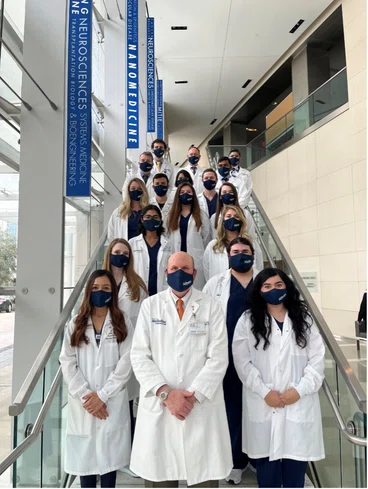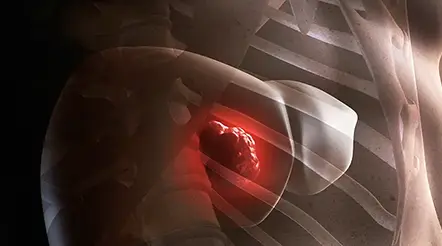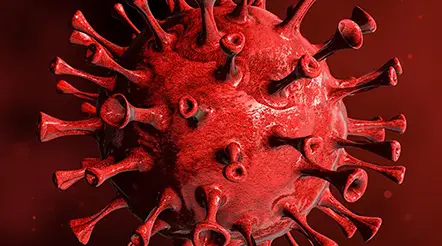


Introduction
Ann Kimball and John W. Johnson Center for Cellular Therapeutics at Houston Methodist
Houston Methodist Dr. Mary and Ron Neal Cancer Center
The Food & Health Alliance within the Houston Methodist Lynda K. and David M. Underwood Center for Digestive Disorders, Immunology Center and the Fondren Inflammation Collaborative
Houston Methodist Cockrell Center for Advanced Therapeutics
Paula and Joseph C. “Rusty” Walter III
Translational Research Initiative
Jerold B. Katz Academy of Translational Research
Infectious Diseases Research Fund
George and Angelina Kostas Research Center for Cardiovascular Medicine
New Endowed Chairs Positions
EnMed
Center for Bioenergetics
result
Clinical Research
Outcomes, Quality and Healthcare Performances
Restorative Medicine
Precision Medicine
Science in Service
of
Medicineresult
President's letter
2022 Metrics
Cycle of Translation
Visionary Gifts of Hope


Introduction

Ann Kimball and John W. Johnson Center for Cellular Therapeutics at Houston Methodist

Houston Methodist Dr. Mary and Ron Neal Cancer Center

The Food & Health Alliance within the Houston Methodist Lynda K. and David M. Underwood Center for Digestive Disorders, Immunology Center and the Fondren Inflammation Collaborative

Houston Methodist Cockrell Center for Advanced Therapeutics

Paula and Joseph C. “Rusty” Walter III Translational Research Initiative

Jerold B. Katz Academy of Translational Research

Infectious Diseases Research Fund

George and Angelina Kostas Research Center for Cardiovascular Medicine

New Endowed Chairs Positions

EnMed

Center for Bioenergetics

From Discovery to Clinic


What is "Discovery to Clinic"?

Clinical Research


Houston Methodist Conducts First-Ever Study into a Challenging Situation

Can Regulating Cellular Aging Mitigate Both Cancer and Heart Disease?

Innovative Treatment for Chronic Rhinitis is Safe and Effective


Masters of Disguise: Glioblastomas Trick the Immune System by Masquerading as Reproductive Tissue
Improved Options for Patients with Severe Retinal Vascular Disease

A New FDA-Approved Treatment for Sufferers of Chronic Constipation

Houston Methodist joins the Gulf Coast Consortia

Outcomes, Quality and Healthcare Performance


New Findings on RNA Helicases May Yield New Intestinal Disease Therapy

Houston Methodist and Pennsylvania State University Collaborate on a Smartphone App That Could Revolutionize Stroke Diagnosis

New Frontiers to Improve Cardiovascular Medicine and Disease Management

Ongoing Lessons in a Pandemic

Transplants can Boost Survival Rate of Patients with Unresectable Liver Cancers

Telehealth Video Visits During the COVID-19 Pandemic – a Glimpse into the Future?

SARS-CoV-2 Induced Chronic Oxidative Stress and Endothelial Cell Inflammation May Increase Likelihood of Cardiovascular Diseases and Respiratory Failure

Restorative Medicine


Lessening Pain After Knee Replacement Surgery

Do Motor Neurons First Die in the Brain? Study Provides Clues about ALS Origins

Bringing Back Hand Function in People with Complete Spinal Cord Injury

Novel Vascular Engineering Platforms Are a Boon for Bioengineering

Ultra-high-Resolution Scanner Reveals if Knee Injury Advances to Osteoarthritis

Houston Methodist Model Demonstrates Reversal from Heart Failure State, Creating the Potential for Innovative Treatment Avenues

Precision Medicine


Rapidly Scalable, All-Inducible Neural Organoids Could Facilitate Drug Screening for Neurological Diseases

Importance of the Coronary Artery Calcium Score in Risk Assessment and Prevention of Atherosclerotic Cardiovascular Disease

COVID-19 Infection in Crucial Brain Regions May Lead To Accelerated Brain Aging

Interleukin 9 Secreting Polarized T Cells Show Potential in Solid and Liquid Tumor Treatment

The NanoLymph: Implantable. Adaptable. Anti-cancer


Ongoing Lessons in a Pandemic

The SARS-CoV-2 Omicron variant was first detected in a patient at Houston Methodist in late November 2021, while the Houston metropolitan area was experiencing a steady decrease in new COVID-19 cases caused by the Delta variant wave. Yet only three weeks later, the Omicron variant had started a new wave of infections and become dominant, responsible for 90% of all new COVID-19 cases and 98% six weeks later.
From late November 2021 through early January 2022, a Houston Methodist genome sequencing study of SARS-CoV-2 identified symptomatic COVID-19 patients with Omicron infections and collected samples for sequencing. From this study, Houston Methodist physician-researchers published the first peer-reviewed U.S. study characterizing Omicron-induced COVID-19 disease in U.S. patients and comparing it to that observed with the Alpha and Delta variants.
The genomic sequences analyzed were from 4,468 Omicron patients from throughout the Houston Methodist health care system and represented a diverse group of symptomatic patients. The study revealed that the Omicron variant became the dominant cause of COVID-19 and spread throughout the metroplex faster than any other SARS-CoV-2 variant, and it also caused more vaccine breakthrough cases. The Omicron patients were notably younger than patients infected with other COVID-19 variants, and fewer required hospitalization. When hospitalization was required, hospital stays were significantly shorter, and less respiratory support was needed.


“This study drives home the importance of analyzing SARS-CoV-2 genome data integrated with patient metadata as well as the need to continue to do so in near real-time as the virus evolves and new variants are generated.”


James Musser, MD, PhD
Chair, Department of Pathology & Genomic Medicine
Fondren Presidential Distinguished Chair
Professor of Pathology and Genomic Medicine
Director, Center for Infectious Diseases Research
Director, Center for Molecular & Translational Human Infectious Diseases Research
There is enough data in various infection models at this point to indicate that Omicron is indeed less virulent than either the Delta or Alpha variants. The researchers posit that increased vaccine breakthrough cases may be caused by serologic or structural differences in Omicron compared to Alpha and Delta or by waning immunity in the community. They also point out that the lower age of Omicron patients may be because it is a demographic less likely to take precautions such as mask wearing or social distancing. Further studies are needed to fully elucidate the causes for the differences between COVID-19 patients infected with these different variants.
This extensive study was possible because at the start of the pandemic, Houston Methodist began a comprehensive and integrated population genomics project with the intent of sequencing all SARS-CoV-2 samples causing COVID-19 in patients at all eight Houston Methodist hospitals in the metroplex. Key to facilitating this project is the large diagnostic microbiology laboratory that serves the entire Houston Methodist system and is integrated into their Research Institute. Randall J. Olsen, MD, PhD, Professor of Clinical Pathology & Genomic Medicine and Paul Christensen, MD, Assistant Professor of Clinical Pathology & Genomic Medicine, who led the genome sequencing and computational analysis efforts, respectively, work closely on this study with Wesley Long, MD, PhD, director of the diagnostic laboratory. They also credit the success of this ongoing project to the incredibly hard work done by a team of exceptional research technologists. To date, this group has sequenced SARS-CoV-2 genomes from over 100,000 patient samples and described many features of four distinct SARS-CoV-2 waves in Houston. The three physician researchers are co-first authors on the published study.
In addition to the findings already mentioned, the sequencing study revealed the presence of a new Omicron sublineage variant in Houston in two patients, the stealth variant BA.2. The Omicron variant contains a deletion of amino acids 69 and 70 in the spike protein, leading to failure of probes to bind to the S gene amplicon in qPCR assays. Increased Omicron prevalence correlated with an increase in the number of qPCR-based diagnostic tests that failed to detect spike (S) gene amplicons. This meant that in order to detect Omicron, an Omicron-specific detection method was required. Enter the S-gene target-failure (SGTF) assay.
The Omicron sublineage variant BA.2 was first identified in November 2021 in Australia and was determined to lack some mutations characteristic of BA.1 while containing mutations unique to BA.2. One key difference is that BA.2 lacks the spike gene deletion in the region encoding amino acid 69/70, which means that it will not be detected by the SGTF assay used to discern Omicron from other variants. For this reason, it became known as the Omicron stealth variant.
To determine whether BA.2 was present in the Houston Methodist system, all full genome sequences in their large database were inspected, including those from symptomatic and asymptomatic individuals. Two members of the BA.2 sublineage were discovered in Houston in samples from individuals who had been asymptomatic. The BA.2 sublineage subsequently displaced BA.1 to become the dominant cause of new infections in the second half of the omicron wave.
Since the time of the publication, the research team has continued to sequence SARS-CoV-2 genomes, in near real-time, from every positive specimen tested in the Houston Methodist laboratory. As the omicron (BA.1 and BA.2) wave subsided during the spring of 2022, the team discovered the arrival of several new variants that are now driving a recent increase in infections among Houston Methodist patients. And while there has been a modest uptick of new infections, Olsen noted that their team is closely monitoring every new sequence for any signal of the next wave.
These new variants, which are descendants of the original omicron (BA.1 and BA.2) variant, include BA.2.12, BA.3, BA.4, BA.5 and XE. According to the authors, these new variants are concerning because preliminary evidence suggests they have acquired additional mutations in the spike protein that enable them to be more transmissible and escape preexisting immunity. It’s clear that the pandemic is not yet over. James M. Musser, MD, PhD, Chair of the Department of Pathology & Genomic Medicine and corresponding author on the paper, reminds us of the significance of these kinds of investigations, “This study drives home the importance of analyzing SARS-CoV-2 genome data integrated with patient metadata as well as the need to continue to do so in near real-time as the virus evolves and new variants are generated.”
The sequencing project remains ongoing and will continue to allow Houston Methodist to detect new variants as they emerge. These data will also be important for future vaccine formulations and long COVID-19 characterization, treatment and prevention.
















